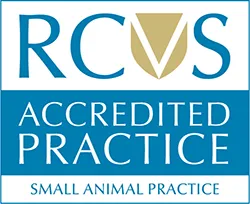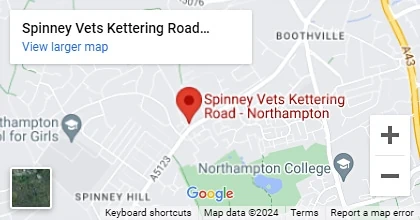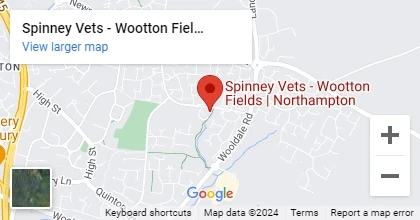You have a lot of control over what your cat eats. It’s therefore your responsibility to ensure that they have the balanced and nutritious diet they need to stay healthy and happy.
Here’s our essential guide to diet and nutrition for cats. This is a broad topic that could potentially run for hundreds of pages, but we’ve decided to keep things simple for now.
Think of this as your starting point. Then, if you have any more questions about feeding your cat, either talk to your vet or give us a call on 01604 648221.
The Basics
The main thing you need to remember when feeding your cat is that cats are carnivores.
While humans can adapt to plant-based diets, cats need meat.
When it comes to nutrition, cats are inflexible. As we’ll see later, there are many things that they simply cannot process. But they will always need the high levels of fat and protein that are only found in meat.
But that’s not to say that you can just feed them any meat. To stay healthy, cats need a good daily dose of vitamins D and E, a source of Omega 6, and a balanced intake of minerals.
When choosing cat food, whether it’s wet or dry, check the packaging to ensure that it meets all of your cat’s nutritional requirements. If you’re unsure which food is right for your cat, ask your vet for some recommendations.
And then comes the even trickier part. Unfortunately, cats can be very fussy eaters.
If they don’t like the taste of the food you choose for them, they’re much more likely to go on a hunger strike than they are to put up and shut up. And obviously, cats that don’t eat – or who don’t eat enough – will likely fall ill before long.
You might have to experiment with a few different brands before you find something that meets your cat’s exacting requirements. But once you start seeing empty bowls and healthy stools – that is, not diarrhea – you’ll know that you’ve struck gold.
Feeding Time & Portion Sizes
When should you feed your cat, how often should you feed them, and how much should you feed them?
Unfortunately, there’s no single right answer to any of these questions. It all depends on a number of factors.
For example, is your cat strictly a house cat, or are they allowed to roam freely outside? Have they been spayed or neutered? How old are they?
All of these issues, and more, will affect your cat’s daily dietary requirements.
Again, your vet will be able to recommend a feeding plan that’s right for your cat. They’ll also be able to advise on portion sizes based on your cat’s weight and their daily calorie requirements. It’s then up to you to stick to these portion sizes – even if they seem too small. In this way, you’ll help your cat to maintain a healthy weight.
As for feeding times, cats like to eat small meals throughout the day. So rather than sticking to a strict feeding schedule, aim to leave food out for your cat to graze on whenever they feel the need.
A good strategy is to put out half of their recommended daily portion in the morning before you leave for work, and the other half when you get home.
Your cat will also have different dietary requirements at different stages of life. Kittens, for instance, being the unstoppable little balls of energy that they are, need a lot more calories than adult cats.
Luckily, most of the leading cat food brands sell different recipes for the various stages of your cat’s life.
Don’t Forget The Water!
No matter how regularly you feed your cats, they’ll always need constant access to clean drinking water.
Without water, cats can become seriously ill in a matter of hours.
And it does have to be water. A persistent myth is that cats like milk, which is why some cat owners sometimes treat cats to a saucer of milk.
But the truth is, most cats are lactose intolerant.
No matter how much they seem to enjoy it, more often than not, milk is not very good for cats at all. It’s certainly no substitution for clean water.
Snacks & Treats
The occasional treat can be a great reward for any cat. But too many treats can make your cat overly finicky. And remember, cats are already fussy eaters. The last thing you want to do is make them even pickier.
Also, overdoing it on the treats will interfere with your cat’s strict nutritional requirements – which, again, are inflexible and demanding as is.
Ultimately, when it comes to snacks and treats, cats are just like you and me: The occasional one now and then won’t hurt, but too much of a good thing can introduce too much salt, and too many calories, to their diet. If left unchecked, this can lead to obesity and all of its associated health problems.
Like with many things, moderation is the key. Snacks and treats should make up no more than 10% of your cat’s diet – if that.
As for when you should treat your cat, it’s pretty simple: As a reward for good behaviour, such as using a scratching post instead of your furniture; or as an “apology” for making them endure something unpleasant, such as teeth cleaning session or a dose of medication.
Cats & “People Food”
Many cat owners like to occasionally treat their cats to titbits from their own plates. This is almost never a good idea.
As we mentioned above, it’s very easy to spoil cats when it comes to food. If you feed your cat too many tasty scraps from your table, there’s every chance that they’ll start to find their own food less palatable.
Your cat’s food has been carefully crafted to contain precisely the right balance of calories and nutrients they need to live a long and happy life. Any action you take to put them off their food might seriously jeopardise their long-term health.
Foods to Avoid Feeding Your Cat
Ideally, you should refrain from giving them any “people food” – but that’s not to say that any food you feed your cat is inherently harmful.
The following items, though, are inherently harmful, and should be avoided at all costs:
- Onions and garlic
- Chocolate
- Raisins and grapes
- Macadamia nuts
- Bread dough
- Alcohol
- Anything containing artificial sweeteners
Cats are also unable to effectively process carbohydrates, which is why it’s a bad idea to feed them dog food – which is often carb-heavy.
So to sum up, stick to the meaty and nutritious cat food, and keep the treats to the bare minimum, and you should meet all of your cat’s dietary requirements.
If you have any more questions about how best to feed your cat, either talk to your vet or give us a call on 01604 648221.








Pet Help Advice